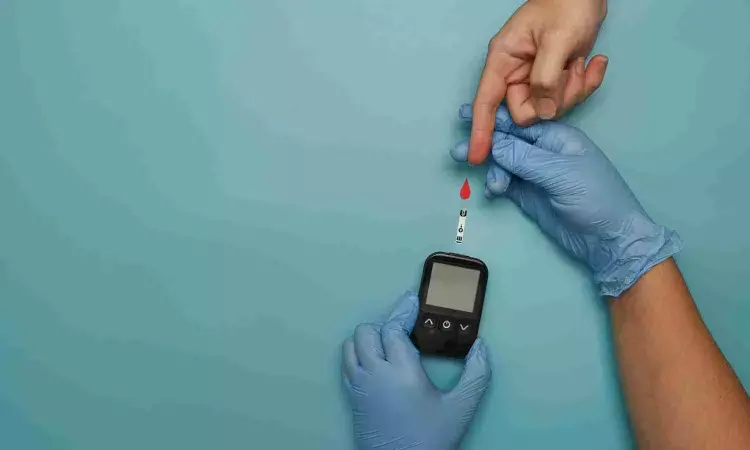- Home
- Medical news & Guidelines
- Anesthesiology
- Cardiology and CTVS
- Critical Care
- Dentistry
- Dermatology
- Diabetes and Endocrinology
- ENT
- Gastroenterology
- Medicine
- Nephrology
- Neurology
- Obstretics-Gynaecology
- Oncology
- Ophthalmology
- Orthopaedics
- Pediatrics-Neonatology
- Psychiatry
- Pulmonology
- Radiology
- Surgery
- Urology
- Laboratory Medicine
- Diet
- Nursing
- Paramedical
- Physiotherapy
- Health news
- Fact Check
- Bone Health Fact Check
- Brain Health Fact Check
- Cancer Related Fact Check
- Child Care Fact Check
- Dental and oral health fact check
- Diabetes and metabolic health fact check
- Diet and Nutrition Fact Check
- Eye and ENT Care Fact Check
- Fitness fact check
- Gut health fact check
- Heart health fact check
- Kidney health fact check
- Medical education fact check
- Men's health fact check
- Respiratory fact check
- Skin and hair care fact check
- Vaccine and Immunization fact check
- Women's health fact check
- AYUSH
- State News
- Andaman and Nicobar Islands
- Andhra Pradesh
- Arunachal Pradesh
- Assam
- Bihar
- Chandigarh
- Chattisgarh
- Dadra and Nagar Haveli
- Daman and Diu
- Delhi
- Goa
- Gujarat
- Haryana
- Himachal Pradesh
- Jammu & Kashmir
- Jharkhand
- Karnataka
- Kerala
- Ladakh
- Lakshadweep
- Madhya Pradesh
- Maharashtra
- Manipur
- Meghalaya
- Mizoram
- Nagaland
- Odisha
- Puducherry
- Punjab
- Rajasthan
- Sikkim
- Tamil Nadu
- Telangana
- Tripura
- Uttar Pradesh
- Uttrakhand
- West Bengal
- Medical Education
- Industry
Sitagliptin Promotes DFU Healing Independent of Glucose Control: Study

A randomized controlled clinical trial has shown that the dipeptidyl peptidase-4 inhibitor sitagliptin may support the healing of diabetic foot ulcers through mechanisms that extend beyond glucose control.
The study compared patients receiving standard conventional therapy alone with those who received sitagliptin in addition to standard care.
The main outcomes examined included ulcer healing, safety, time to healing, changes in circulating endothelial progenitor cells, levels of stromal cell derived factor-1 alpha, and glycosylated hemoglobin. Findings demonstrated that patients treated with sitagliptin experienced greater reductions in ulcer size and overall improvement in wound healing compared to those on conventional therapy alone.
The sitagliptin group also showed an increase in circulating endothelial progenitor cells and higher levels of stromal cell derived factor-1 alpha, suggesting that the drug may enhance vascular repair and tissue regeneration. Notably, there were no differences in long-term blood glucose markers between the groups, indicating that the beneficial effect of sitagliptin on wound healing was independent of its role in glycemic regulation. Safety analysis revealed no adverse events associated with sitagliptin, supporting its tolerability in this patient population.
These results are clinically meaningful because diabetic foot ulcers represent one of the most serious complications of diabetes, often leading to prolonged disability, infection, or amputation. Conventional treatment approaches remain limited in their ability to accelerate wound closure, and the addition of a therapy that can stimulate vascular healing without added safety concerns could offer new hope for patients.
The findings also highlight the therapeutic potential of targeting endothelial progenitor cell mobilization and related pathways in diabetic wound management. While larger trials will be required to confirm these outcomes and to explore long-term implications, this study provides encouraging evidence that sitagliptin may serve as a valuable adjunctive therapy in the treatment of diabetic foot ulcers. By improving wound healing independently of glucose control, sitagliptin underscores the importance of considering pleiotropic benefits of antidiabetic drugs in managing complications of diabetes.
W. Gao, D. Chen, H. He, N. Jiang, L. Chen, and X. Ran, “ Sitagliptin, a DPP-4 Inhibitor, Effectively Promotes the Healing of Diabetic Foot Ulcer: A Randomized Controlled Trial,” Journal of Diabetes 17, no. 9 (2025): e70156, https://doi.org/10.1111/1753-0407.70156.
Dr. Shravani Dali has completed her BDS from Pravara institute of medical sciences, loni. Following which she extensively worked in the healthcare sector for 2+ years. She has been actively involved in writing blogs in field of health and wellness. Currently she is pursuing her Masters of public health-health administration from Tata institute of social sciences. She can be contacted at editorial@medicaldialogues.in.
Dr Kamal Kant Kohli-MBBS, DTCD- a chest specialist with more than 30 years of practice and a flair for writing clinical articles, Dr Kamal Kant Kohli joined Medical Dialogues as a Chief Editor of Medical News. Besides writing articles, as an editor, he proofreads and verifies all the medical content published on Medical Dialogues including those coming from journals, studies,medical conferences,guidelines etc. Email: drkohli@medicaldialogues.in. Contact no. 011-43720751


